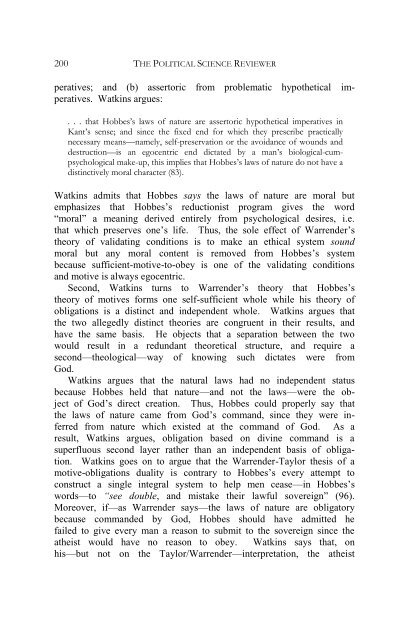Strauss and Watkins on Hobbes' Political Philosophy: A Review
Strauss and Watkins on Hobbes' Political Philosophy: A Review
Strauss and Watkins on Hobbes' Political Philosophy: A Review
Create successful ePaper yourself
Turn your PDF publications into a flip-book with our unique Google optimized e-Paper software.
200 THE POLITICAL SCIENCE REVIEWER<br />
peratives; <str<strong>on</strong>g>and</str<strong>on</strong>g> (b) assertoric from problematic hypothetical im-<br />
peratives. <str<strong>on</strong>g>Watkins</str<strong>on</strong>g> argues:<br />
. . . that Hobbes’s laws of nature are assertoric hypothetical imperatives in<br />
Kant’s sense; <str<strong>on</strong>g>and</str<strong>on</strong>g> since the fixed end for which they prescribe practically<br />
necessary means—namely, self-preservati<strong>on</strong> or the avoidance of wounds <str<strong>on</strong>g>and</str<strong>on</strong>g><br />
destructi<strong>on</strong>—is an egocentric end dictated by a man’s biological-cum-<br />
psychological make-up, this implies that Hobbes’s laws of nature do not have a<br />
distinctively moral character (83).<br />
<str<strong>on</strong>g>Watkins</str<strong>on</strong>g> admits that Hobbes says the laws of nature are moral but<br />
emphasizes that Hobbes’s reducti<strong>on</strong>ist program gives the word<br />
“moral” a meaning derived entirely from psychological desires, i.e.<br />
that which preserves <strong>on</strong>e’s life. Thus, the sole effect of Warrender’s<br />
theory of validating c<strong>on</strong>diti<strong>on</strong>s is to make an ethical system sound<br />
moral but any moral c<strong>on</strong>tent is removed from Hobbes’s system<br />
because sufficient-motive-to-obey is <strong>on</strong>e of the validating c<strong>on</strong>diti<strong>on</strong>s<br />
<str<strong>on</strong>g>and</str<strong>on</strong>g> motive is always egocentric.<br />
Sec<strong>on</strong>d, <str<strong>on</strong>g>Watkins</str<strong>on</strong>g> turns to Warrender’s theory that Hobbes’s<br />
theory of motives forms <strong>on</strong>e self-sufficient whole while his theory of<br />
obligati<strong>on</strong>s is a distinct <str<strong>on</strong>g>and</str<strong>on</strong>g> independent whole. <str<strong>on</strong>g>Watkins</str<strong>on</strong>g> argues that<br />
the two allegedly distinct theories are c<strong>on</strong>gruent in their results, <str<strong>on</strong>g>and</str<strong>on</strong>g><br />
have the same basis. He objects that a separati<strong>on</strong> between the two<br />
would result in a redundant theoretical structure, <str<strong>on</strong>g>and</str<strong>on</strong>g> require a<br />
sec<strong>on</strong>d—theological—way of knowing such dictates were from<br />
God.<br />
<str<strong>on</strong>g>Watkins</str<strong>on</strong>g> argues that the natural laws had no independent status<br />
because Hobbes held that nature—<str<strong>on</strong>g>and</str<strong>on</strong>g> not the laws—were the ob-<br />
ject of God’s direct creati<strong>on</strong>. Thus, Hobbes could properly say that<br />
the laws of nature came from God’s comm<str<strong>on</strong>g>and</str<strong>on</strong>g>, since they were in-<br />
ferred from nature which existed at the comm<str<strong>on</strong>g>and</str<strong>on</strong>g> of God. As a<br />
result, <str<strong>on</strong>g>Watkins</str<strong>on</strong>g> argues, obligati<strong>on</strong> based <strong>on</strong> divine comm<str<strong>on</strong>g>and</str<strong>on</strong>g> is a<br />
superfluous sec<strong>on</strong>d layer rather than an independent basis of obliga-<br />
ti<strong>on</strong>. <str<strong>on</strong>g>Watkins</str<strong>on</strong>g> goes <strong>on</strong> to argue that the Warrender-Taylor thesis of a<br />
motive-obligati<strong>on</strong>s duality is c<strong>on</strong>trary to Hobbes’s every attempt to<br />
c<strong>on</strong>struct a single integral system to help men cease—in Hobbes’s<br />
words—to “see double, <str<strong>on</strong>g>and</str<strong>on</strong>g> mistake their lawful sovereign” (96).<br />
Moreover, if—as Warrender says—the laws of nature are obligatory<br />
because comm<str<strong>on</strong>g>and</str<strong>on</strong>g>ed by God, Hobbes should have admitted he<br />
failed to give every man a reas<strong>on</strong> to submit to the sovereign since the<br />
atheist would have no reas<strong>on</strong> to obey. <str<strong>on</strong>g>Watkins</str<strong>on</strong>g> says that, <strong>on</strong><br />
his—but not <strong>on</strong> the Taylor/Warrender—interpretati<strong>on</strong>, the atheist
















